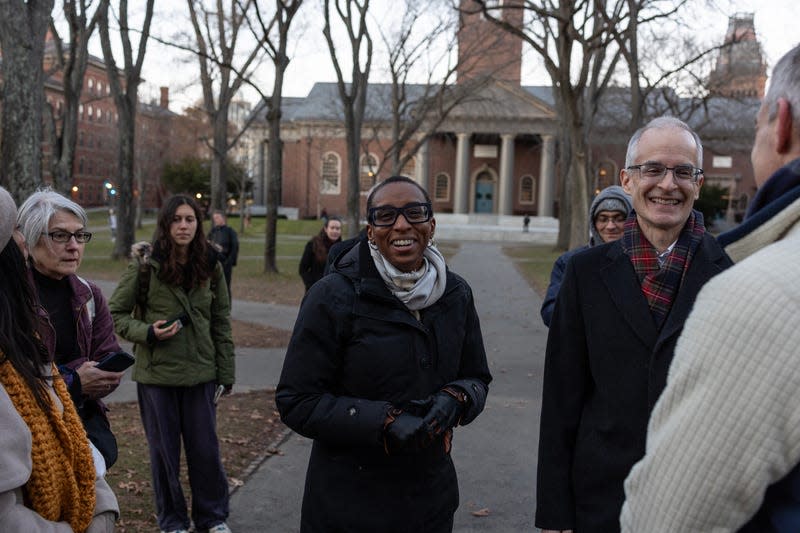Harvard University President Claudine Gay Is Out. Here's How We Got Here

- Oops!Something went wrong.Please try again later.
CAMBRIDGE, MA - DECEMBER 13: Harvard President Claudine Gay (C) attends a menorah lighting ceremony on the seventh night of Hanukkah with the University’s Jewish community on December 13, 2023, in Harvard Yard, Cambridge, Massachusetts. The Harvard trustees voted to keep President Gay after she responded to a Congressional hearing with an answer to a question about hate speech on campus.
Harvard University President Claudine Gay has resigned from her position — making her tenure the shortest ever in the University’s centuries-old existence.
The news was originally reported by the Boston Globe and The Harvard Crimson, who claimed that sources close to the decision informed them of her resignation. However, Gay later confirmed the news in a statment.
Read more
Cale Yarborough Won The Daytona 500 In A Show Car Borrowed From A Local Hardee's Restaurant
Three Decades Later, Someone Has Finally Beaten Tetris On NES
10 Sci-Fi Movies to Stream on Netflix Instead of Hatewatching Rebel Moon
Last month, several university presidents were questioned by conservative members of Congress about protests held by pro-Palestinian student groups. Lawmakers demanded that Presidents from Harvard, the University of Pennsylvania, and Yale condemn these protests as antisemitic.
Things rapidly escalated from there. Conservatives began demanding their resignation, arguing that they hadn’t condemned antisemitism forcefully enough. And four days after the hearing, University of Pennsylvania President Elizabeth Magill resigned.
But then, a new allegation began to pick up steam.
Plagiarism Scandal Rocks Harvard
In early December, right-wing activist Christopher Russo and conservative journalist Christopher Brunet posted an article called “Is Claudine Gay a Plagiarist?”
The substack post alleged that Gay had plagiarized portions of her 1997 PH.D dissertation on Black political power from authors Lawrence Bobo and Franklin Gilliam and others. They allege that although she regularly referenced the scholars, she failed to properly cite and use quotation marks when referencing their work.
They also accused her of lifting from Carol Swain’s book “Black Faces, Black Interests,” this time without referencing her.
Here are two passages they highlighted as an example:
Pitkin distinguishes between “descriptive representation,” the statistical correspondence of the demographic characteristics … and more “substantive representation,” the correspondence between representatives’ goals and those of their constituents.
The bottom quote is from Gay’s work:
Social scientists have concentrated . . . between descriptive representation (the statistical correspondence of demographic characteristics) and substantive representation (the correspondence of legislative goals and priorities).
The following day, the conservative online outlet the Washington Free Beacon published additional accusations of plagiarism.
Harvard University Gets Involved
Days after the plagiarism allegations emerged publicly, Harvard’s Board penned a letter vigorously defending her.
In the letter, the University Board said they became aware of plagiarism allegations against Gay in October. They said that Gay requested that they investigate these allegations and that they “found no violation of Harvard’s standards for research misconduct.” Instead, they said that Gay requested four corrections to “insert citations and quotation marks that were omitted from the original publications.”
Gay also denied the allegations.
Additional Accusations of Plagiarism
That letter might have been the end of it if more accusations of plagiarism hadn’t surfaced. Within days, the Washington Free Beacon reported that an anonymous complaint of plagiarism had been sent to the the University.
The University responded in a summary sent to the Boston Globe, saying that an outside investigation found additional “examples of duplicative language without appropriate attribution” in her dissertation on Black electoral power. However, they said that this did not “constitute research misconduct.”
Republicans in Congress quickly seized on the new allegations and launched a review of the allegations of plagiarism.
The Final Nail In The Coffin?
Students on the Harvard Crimson editorial board began calling for her resignation. And on Monday, the Washington Free Beacon released an additional anonymous complaint, accusing her of six additional allegations of plagiarism, bringing the total up to nearly 50. Although, it’s worth noting that number far exceeds the “duplication language,” found in Harvard’s independent investigation. It’s also worth noting that no one has accused her of graver academic misconduct wholesale lifting ideas from other academics or falsifying her research.
But on Tuesday, she released a statement announcing her resignation. “It is with a heavy heart but a deep love for Harvard that I write to share that I will be stepping down as president,” she said in a letter obtained by ABC News. “This is not a decision I came to easily. Indeed, it has been difficult beyond words because I have looked forward to working with so many of you to advance the commitment to academic excellence that has propelled this great university across centuries.”
More from The Root
The Texas Longhorns’ season-long bank heist fell short at the vault
Who is Marvel’s Echo and how is she one of the universe’s most powerful people in the comics?
Sign up for The Root's Newsletter. For the latest news, Facebook, Twitter and Instagram.
